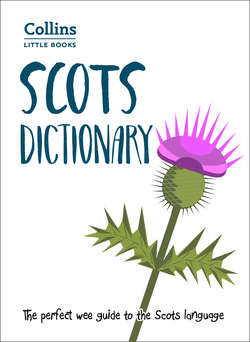Читать книгу Scots Dictionary: The perfect wee guide to the Scots language - Collins Dictionaries, Collins Dictionaries - Страница 23
Оглавлениеcamstairy
camstairy (kam-stair-ee) or camsteerie (kam-steer-ee) Camstairy means quarrelsome, stubborn, or unruly.
canary To have a canary is to throw a tantrum or have an emotional outburst: She’ll have a canary when she sees this mess.
Candlemas The 2nd of February, Candlemas, is one of the four quarter days or term days in Scotland.
canna (rhymes with manna) or cannae (rhymes with granny) In many parts of Scotland, canna means cannot: Ye canna park here; I cannae be bothered.
canny Canny has a number of meanings the first of which, astute or cautious with money, is in general usage throughout Britain. Canny also means good or nice: bonnie wee thing, canny wee thing. Canny can mean lucky or fortunate. In Scottish (and Northeast English) dialect, canny means rather or quite: I’ve been waiting a canny long while.
cantrip or cantraip A cantrip is a spell or magic charm: By some devilish cantrip slight, each in its cold hand held a light. To cast cantrips is to perform magic spells: A witch, that for sma’ price, can cast her cantraips, and give me advice. A cantrip is also a playful trick or a sleight of hand.
capercailzie or capercaillie (cape-er-kale-yee or cap-er-kale-yee) A capercailzie is a large European woodland grouse. In Scotland, it is found mainly in the eastern Highlands from Tayside to Easter Ross, although it may be found as far west as the Loch Lomond islands. It has a black plumage and the male has a fan-shaped tail. [The word comes from the Gaelic capull coille horse of the woods]
carnaptious (car-nap-shuss) Carnaptious is a word meaning grumpy, bad-tempered, or irritable: He’s a carnaptious auld devil! [The word comes from knap bite and the intensifier car-]
carry-code In some areas of Scotland, a carry-code is a ride on someone’s back and shoulders. Also called (elsewhere) backie, coal carry, coalie backie, or cuddyback.
carry-out or cairry-oot A person’s carry-out is the takeaway drink or food they have bought from a bar, off-licence, or restaurant: Let’s get a carry-out before the bar closes. A carry-out is also a restaurant from which takeaway food can be bought: There’s a good Chinese carry-out on the High Street.
carse (rhymes with farce) A carse is an area of low-lying fertile land near a river. The word is often used in place names such as the Carse of Gowrie and the Carse of Stirling.
cateran (cat-er-an) In the past, a cateran was a bandit, robber, or mercenary of the Scottish Highlands. [The word comes from the Gaelic ceathairneach plunderer, and dates from the 14th century]
caul In Southern Scotland, a caul is a weir or a dam.
cauld Cauld means cold: a wee dram to keep out the cauld; It was awfy cauld this mornin.
cauldrife (cawl-drif) Someone who is cauldrife is prone to feeling the cold easily. Cauldrife also means lifeless.
cauld-wind If bagpipes are described as cauld-wind, they are filled by bellows rather than by blowing.
causey A causey is a cobbled street, road, or way. A causey stane is a cobble or paving stone.
ceilidh (kale-ee) A ceilidh is an informal social gathering with folk music, singing, dancing, and storytelling. This kind of gathering, which is popular in the Highlands and Islands, is normally held in someone’s house. In the rest of Scotland, a ceilidh is more of an organized evening of entertainment. Ceilidhs take place in hotels or halls hired for the evening and involve Scottish country dancing to music played usually on accordions and fiddles. Some dances are for couples and some for larger groups. [The word is Gaelic]
Celt 1 (kelt) A Celt is a person from Scotland, Wales, Ireland, the Isle of Man, Cornwall, or Brittany, especially one who speaks a Celtic language. The Celts were an Indo-European people who in pre-Roman times inhabited Britain, Gaul, Spain, and other parts of West and Central Europe. Something which is Celtic is of or concerned with the Celts or their languages. Celtic is a branch of the Indo-European family of languages that includes Gaelic, Welsh, and Breton, still spoken in parts of Scotland, Ireland, Wales, and Brittany. Modern Celtic is divided into the Brythonic (southern) and the Goidelic (northern) groups. 2 (selt) A Celt is player or supporter of Celtic, one of Scotland’s largest and oldest football clubs.
